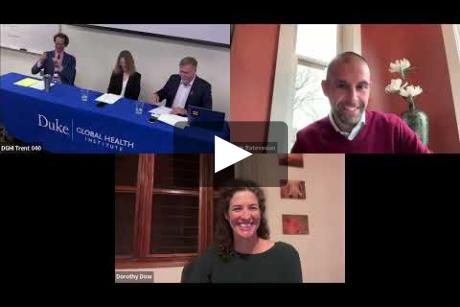
Henry Rice listens to a student talk during a course he teaches, Global Surgical Care, inside Trent Hall in September 2022.
Published December 29, 2023, last updated on January 8, 2024 under Research News
Professors at the Duke Global Health Institute and the University of Global Health Equity in Rwanda will host a free workshop this month, which will strengthen manuscript writing skills for students and researchers.
The “Scientific Writing Workshop” will be Jan. 16 and 18, starting at 7am EST/2 pm CAT. Attendees to both three-hour sessions will learn the basics of writing, how to prepare a manuscript for publication and include various writing exercises. The workshop will be in-person at UGHE’s Flat Learning Studio in Butaro, Rwanda and accessible via Zoom.
One reason for the two-day event is to aid writers whose first language isn’t English. DGHI’s Henry Rice, M.D., notes the workshop will sharpen writing skills to help researchers compete in a space still often dominated by English.
“Our responsibility is not just to the people who pay tuition at Duke, but to the people who aren’t getting a degree with us – our partners,” says Rice, a professor of surgery, pediatrics and global health. “This workshop gets to the heart of the DGHI ethos. We are training the next generation of global health leaders, and this is part of the educational portfolio we want to bring to our partners.”
Leading the training with Rice are UGHE’s Pierrette Mukundwa, M.D., a lecturer in global health delivery and Barnabas Alayande, M.D., an assistant professor of surgery and global health. DGHI and UGHE hosted a similar workshop in 2022.
Rice says the workshop will also benefit researchers who are writing their first paper or whose background is primarily in healthcare. “This course also teaches people how to format their figures and tables to be an effective storyteller, and how to write so that it captures the reader,” he says. “Scientific writing is inherently challenging. You’re not born with it, you develop it in time.”
Rice’s involvement in the workshop is inspired by his time as a research fellow at the University of California, San Francisco nearly 30 years ago. He took a similar course while writing his first manuscripts. As his career evolved, he wanted to share the same knowledge with those who will move global health forward in the coming years. Rice says part of making global health equitable is ensuring partners from low- and middle-income countries have the skills to lead. Part of that is knowing how to communicate effectively in writing and conversations.
“When we hosts these, we learn, adapt it and make sure it’s the style and structure participants want,” he says, noting the workshop isn’t a lecture. “You don’t learn how to write by someone telling you how to do it. You learn by writing.”


